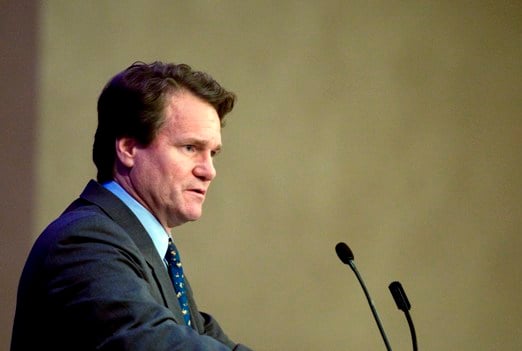Bank of America's chief executive Brian Moynihan warned Wednesday that adviser productivity and profit margins at Merrill Lynch may continue to fall in coming quarters as the firm sacrifices short-term profitability for long-term growth.
At Merrill Lynch, which has the second-most productive advisers in the business behind UBS Wealth Management Americas, annualized revenue per adviser dropped to $1.04 million, down from $1.06 million a year ago. Productivity has trended downward since peaking in the third quarter of last year.
Meanwhile, head count in the second quarter rose around 4% to 14,370 advisers, from 13,844 last year, as the firm has focused on expanding its training program and hiring more veteran advisers from competitors.
“You should expect our adviser count to go up, and productivity may come down per adviser,” Mr. Moynihan said in a conference call discussing second-quarter earnings, noting that it takes time for experienced advisers to bring over their book of business from their previous firms and for trainees to build up their own businesses.
“Their books are coming in,” he said. “They're building their books, and as that maturity happens you'll see it in better numbers.”
Long-term, Mr. Moynihan said he is not concerned. "Frankly, bringing [productivity] down a little bit to get a lot more growth in advisers would be a great trade for our company.”
Merrill Lynch brought in the most experienced advisers since the second quarter of 2011, according to firm spokesman Matthew Card. It also graduated 132 advisers from its three-year practice management and development training program in the second quarter. In the past year, 911 advisers have been hired into the PMD program, according to data provided by Mr. Card.
That runs counter to numbers industrywide and at Merrill Lynch's wirehouse competitors, which have mostly seen
slight but continued declines in numbers of advisers.
“We had to create more advisers than are out there,” Mr. Moynihan said. “We've worked hard on the PMD program … and that is now reaping benefits.”
As a result of productivity declines, the profit margin at Bank of America's global wealth and investment management segment, which includes Merrill Lynch and the high-net worth-focused U.S. Trust unit, fell to 24%, from 26.6% in the year-earlier quarter.
The adviser buildout “should have a benefit over time, although it's having a drag on profitability right now because it's an investment,” Mr. Moynihan said.
Mr. Moynihan added that margins should also go up because the retention bonuses given out in the form of forgivable loans to some advisers following the 2008 merger will have all fully vested by the end of the year. He said that Merrill Lynch executives also still had some more work to do to further reduce expenses.
“The team is working hard on revenue expense management,” he said. “We're starting to see some better signs, but they have some work to do still.”
The firm is also on track regarding another major investment at the firm: the transfer of fee-based assets onto its Merrill Lynch One platform, according to Mr. Card. Roughly $410 billion, about 73% of the firm's fee-based assets, were on the platform at the end of the second quarter. The deadline to transition clients in fee-based accounts onto Merrill One is the end of the year.
Overall, Merrill Lynch reported client balances, which include loans and cash deposits at the bank, of $2.05 trillion, up from $2.02 trillion a year ago.







